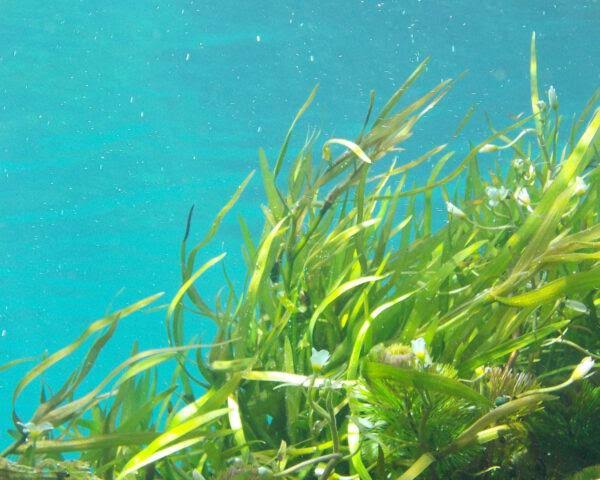Unimaginable Benefits of Sea Weeds On The Environment

While the news often mentions the terrible things in the sea, such as gyres of plastic and other trash, the oceans also hold an extremely valuable resource: seaweed. This renewable and easily harvestable organism is used for everything from food to spa treatments to a possible COVID-19 medicine. This eco-friendly ingredient also features in many common products, including paint, toothpaste, ice cream and beer.
Farming seaweed
People collect seaweed both wild and cultivated from seaweed farms. Wild picking involves either wading into the seawater to gather the slippery crop or picking it up off the shoreline. Especially abundant harvests usually come post-storm when seaweed washes onshore. For centuries, people gathered seaweed using this traditional method.
Nowadays, according to the Food and Agriculture Organization, 96% of global seaweed production comes from farms instead of wild gathering. Depending on the type of seaweed grown, farming may involve attaching the seaweed to rope lines suspended in the sea just off the coast, or growing the seaweed in nets. Seaweed farming in Japan started in the 1600s, and the practice may date back to the 15th century in Korea. Other parts of Asia, including China, Indonesia and the Philippines, also produce seaweed for food and other products. In the Philippines alone, about 40,000 people made their living from seaweed production in the late 90s.
Read also: 2 Out Of 5 Plant Species Are On The Brink of Extinction
When it’s time to harvest seaweed, people in most seaweed-growing countries use boats and machinery like rakes or trawlers. While easier than hand collection, harvesting with these tools can adversely affect habitats and wreck sea animals’ homes. To combat this, farmers in Norway devised a rake method that only removes the floating top canopy of seaweed, this avoiding seabed disruption.
Seaweed helping the environment
Farming seaweed might even improve the sea’s health, according to findings from Chinese researchers in a 2019 issue of Stochastic Environmental Research and Risk Assessment. Research found that seaweed aquaculture can help combat eutrophication, the process whereby water becomes so overly enriched with nutrients that it causes excessive algae growth and oxygen depletion. The study discovered that seaweed aquaculture removed more than 75,000 metric tons of nitrogen and more than 9,500 metric tons of phosphate from coastal waters. Seaweed aquaculture also sequestered and absorbed a large amount of CO2 and released more than a million metric tons of oxygen. As a natural filter, seaweed helps remove pollutants from the environment; this does mean people should eat seaweed in moderation, though, as it can contain high levels of metals and iodine.
In addition to keeping oceans healthy, seaweed also helps terrestrial farmers. When used as fertilizer, seaweed helps farmers avoid using nearly 30,000 tons of chemical fertilizers. Summarizing these benefits, the seaweed study’s authors wrote, “These results demonstrate that Chinese seaweed aquaculture has turned the pollutants that cause eutrophication into nutrients, which generates considerable environmental benefits as well as socio-economic values.”
Seaweed in cosmetics and medicine
Diverse parts of the world use seaweed in cosmetics, too. Many Tanzanian women farm seaweed for export to China, Korea, Vietnam and other countries that use it as an ingredient in cosmetics and skincare products.
Even Ireland has harvested seaweed for hundreds of years. A 12th-century poem recounts how monks distributed edible seaweed to hungry poor people. In the early 20th century, the Irish coast housed nearly 300 seaweed bathhouses. You can still find some places in County Sligo to take a traditional seaweed bath. “This is our traditional spa treatment,” said Neil Walton, owner of Voya Seaweed Baths in the town of Strandhill.
Scientists continue searching for more health benefits from seaweed. The Rensselaer Polytechnic Institute in New York has even explored using seaweed extract to treat COVID-19. This extract contains variations of heparin, a common anticoagulant. Though heparin usually comes from animal tissue, this seaweed alternative may become popular. If so, this could lower costs for seaweed as a biofuel resource.
Seaweed as biofuel
Seaweed aquaculture may also increase the use of biomass as renewable energy. In 2015, biomass-derived energy accounted for about 5% of U.S. energy use. Biomass energy encompasses plant and animal-derived energy, such as food crop waste, animal farming, human sewage, wood or forest residue and horticultural byproducts. So far, seaweed as biofuel has garnered little commercial interest, and the market remains mostly unexplored. But the industry holds great potential. According to Advanced Research Projects Agency-Energy, a United States government agency that funds and promotes research and development of energy technologies, U.S. seaweed cultivation could reach 500 million tons and provide more energy than 23 billion gallons of gasoline.
Seaweed farming paired with other industries
Seaweed farming can also work with other industries, such as fish farming. Some environmental experts worry that open-sea fisheries negatively impact ecosystems due to the excess fish feed and fish feces floating in the water. Integrating seaweed production into fish farms could help reduce nitrogen emissions and break down other pollutants.
A seaweed farm could also pair well with an offshore wind farm. The first such operation is being built by Belgian-Dutch consortium Wier & Wind this year. The company plans to grow patches of seaweed for biofuel between large turbines 23 km off Zeebrugge in Belgium. This combination may lead to a genius symbiotic relationship. Seaweed production would make use of large open spaces between turbines, and the turbines would prevent ships from running over floating seaweed.
